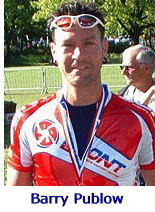 |  | |||||||||||||||||||||||||||||||||||||||
 | ||||||||||||||||||||||||||||||||||||||||
Inline Marathoning > Advanced Skills Marathon Training and Racing for the Advanced Competitor
But the information age has yet to catch up with the marathon skater. While some web and print resources exist for novice skaters, there's not much out there for advanced skaters. And it is often the advanced skaters who want more. After skating a few marathons, they're no longer content with simply finishing. They want to go fast and do well. Train Smart Whenever you think about training, be sure to consider these key variables: volume, intensity, rest, and recovery. These variables determine how your training affects your performance. One of the least understood of the variables is volume, which is the mileage logged by skaters as they prepare for events. The truth is that most skaters log way too many miles while ignoring anaerobic conditioning and recovery. Runner You Are Not! Inliners often look to marathon running as a guide to skate training. But this often leads to faulty training methods and, ultimately, poor outcomes. The truth is: running a marathon is quite different than skating one. Running a marathon is primarily an individual undertaking and therefore demands a steady pace. Skating a marathon is a pack sport (like road cycling) that involves a highly varied pace with frequent bursts of speed (due to breakaways). Another difference involves impact levels. The pounding motion of running puts a lot of stress on leg muscles. Marathon runners condition themselves to handle the stress by running as much as 20 to 23 miles a day in the final stage of training. But the pushing motion of skating involves far less impact. Therefore, skaters don't need this kind of conditioning. Another difference involves duration. Marathon distances are the same for runners and skaters, but skaters go about twice as fast. Therefore, they complete marathons in about half the time. An advanced skater can finish a marathon in 1:30-1:40 (hours/minutes) while an advanced runner will take 3-3:20. To prepare for marathons, runners log training sessions of 2:30-2:45. By comparison, skaters only need sessions of about 1:20. So why do many marathon skaters log workouts of three hours or more? ... I'm baffled by this. But don't get me wrong: Base preparation and logging miles is an important stage in pre-season training. However, once a skater is reasonably fit and can comfortably skate the distance, the emphasis should shift to speed, which is where many skaters go astray. Go to: Part 1: Marathon Training for Advanced Skaters Part 2: Want to race fast? ... train fast! Part 3: Interval training for marathon skaters Part 4: Maximizing Your Starts and Resting While You Race Related reading: • Beginner's guide to outdoor racing. Go to Part Two: Wanna Race Fast? ... Train Fast! (Copyright 2006 Barry Publow) (Barry Publow is coach of the Canadian national inline speed skating team and a former national champion. He is the author of Speed on Skates and an expert on sport-specific technique, biomechanics and training application. At his Breakaway SpeedCamps, he has shared his knowledge of skating with hundreds of skaters in Canada, the United States and Europe.) Related reading: | Go to: Part 1: Marathon Training for Advanced Skaters Part 2: Want to race fast? ... train fast! Part 3: Interval training for marathon skaters Part 4: Maximizing Your Starts and Resting While You Race Related reading: | |||||||||||||||||||||||||||||||||||||||
... Copyright © 2006 by Robert Burnson | ||||||||||||||||||||||||||||||||||||||||

